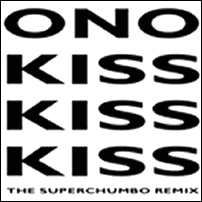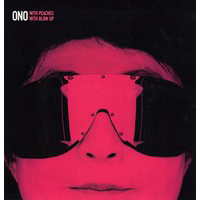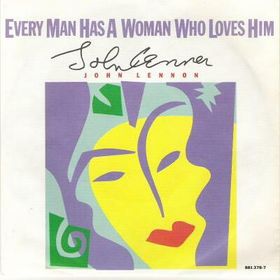
"Every Man Has a Woman Who Loves Him" is a song by Yoko Ono from the album Double Fantasy with John Lennon. Other versions were released, including one released as a single where Ono's voice was removed, leaving what had been Lennon's backing vocal as the primary vocal.
"Well Well Well" is a song by English musician John Lennon from his 1970 album John Lennon/Plastic Ono Band. The eighth and longest track on the album, "Well Well Well" features an aggressive guitar sound, screaming vocals and a pounding backing track.
"Cleanup Time" is a song written by John Lennon released on his 1980 album Double Fantasy. It was also included on the compilation album Lennon.

"I'm Losing You" is a song written by John Lennon and released on his 1980 album Double Fantasy. It was written in Bermuda in June 1980, after several attempts by Lennon to call his wife, Yoko Ono, who remained in New York. The song is also available on the 1982 compilation The John Lennon Collection, the 1998 boxset John Lennon Anthology, the one disc compilation Wonsaponatime, the 2005 two disc compilation Working Class Hero: The Definitive Lennon and in 2010 for the Gimme Some Truth album. The song was also featured in the 2005 musical Lennon.
"Out the Blue" is a song written by John Lennon and originally released on his 1973 album Mind Games. The song is included on the 1990 boxset Lennon, the 2005 two-disc compilation Working Class Hero: The Definitive Lennon, the 2010 album Gimme Some Truth and the 2020 compilation album Gimme Some Truth. The Ultimate Mixes.
"I Know (I Know)" is a song written by John Lennon released on his 1973 album Mind Games. The song is included on the 1998 box set John Lennon Anthology and the 2020 compilation album Gimme Some Truth. The Ultimate Mixes.

"Sisters, O Sisters", also known as "Sisters O Sisters", is a song written by Yoko Ono that first appeared on John Lennon's and Yoko Ono's 1972 Plastic Ono Band album Some Time in New York City, backed by Elephant's Memory. It was also released as the b-side to the couple's "Woman Is the Nigger of the World" single. It has been covered by a number of artists, including Le Tigre and Tater Totz.
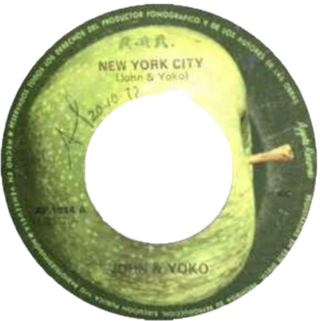
"New York City" is a song written by John Lennon that was first released on Lennon's and Yoko Ono's 1972 Plastic Ono Band album Some Time in New York City.
"We're All Water" is a song written by Yoko Ono that was first released on the 1972 John Lennon and Yoko Ono Plastic Ono Band album Some Time in New York City. It was the last song on the first record of the album, and the last song on the album that was recorded in the studio.
"Bless You" is a song written by John Lennon that was first released on his 1974 album Walls and Bridges. It is a ballad expressing his love for his wife Yoko Ono, from whom he was separated at the time. Alternative versions appeared on the compilation albums Menlove Ave. and John Lennon Anthology.
"Scared" is a song written by John Lennon that was first released on his 1974 album Walls and Bridges. Alternate versions were subsequently released on the compilation albums Menlove Ave. and John Lennon Anthology.
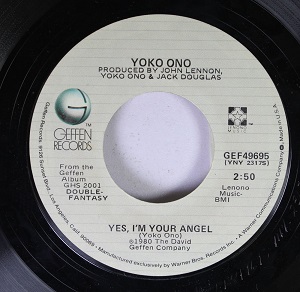
"Yes, I'm Your Angel", also known as "I'm Your Angel", is a song written by Yoko Ono that was first released on Ono's and John Lennon's 1980 album Double Fantasy. It was later released as the b-side of Lennon's single "Watching the Wheels." The initial release of Double Fantasy used the title "I'm Your Angel" but later releases as well as the single used the title "Yes, I'm Your Angel."
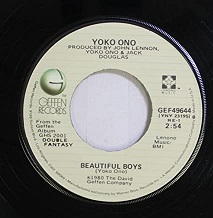
"Beautiful Boys" is a song written by Yoko Ono that was first released on Ono's and John Lennon's 1980 album Double Fantasy. It was later released as the B-side of Lennon's #1 single "Woman."

"I'm Moving On" is a song by Yoko Ono. It was originally recorded for 1980's Double Fantasy album, with John Lennon. A remix was released on iTunes on 25 September 2012. The remix debuted at number 39, and peaked at number 4.
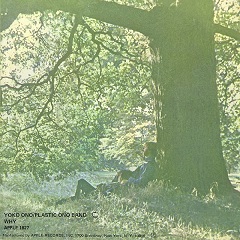
"Why" is a song written by Yoko Ono that was first released on her 1970 Yoko Ono/Plastic Ono Band album. In the U.S. it was also released as the B-side of John Lennon's "Mother" single, taken from his John Lennon/Plastic Ono Band album.

"Touch Me" is a song written by Yoko Ono that was first released on her 1970 album Yoko Ono/Plastic Ono Band. An edited version was later released in the U.S. as the b-side to John Lennon's single "Power to the People."
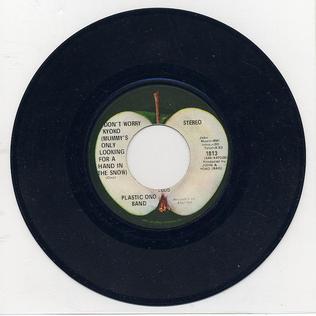
"Don't Worry Kyoko (Mummy's Only Looking for A Hand in the Snow)" is a song by Yoko Ono that was originally released by Plastic Ono Band in October 1969 as the B-side of the "Cold Turkey" single, and was later released on Ono's 1971 album Fly. Several live versions have been released, including on Plastic Ono Band's Live Peace in Toronto 1969 and the John & Yoko/Plastic Ono Band With Elephant's Memory album Some Time in New York City in 1972. An early version was titled "Mum's Only Looking for Her Hand in the Snow". It has been covered by several other artists.

"Who Has Seen the Wind?" is a song written by Yoko Ono that first appeared as the B-side of John Lennon's single "Instant Karma!" It was later issued as a bonus track on a compact disc version of the Wedding Album.

"Listen, the Snow Is Falling" is a song written by Yoko Ono and recorded by Ono and the Plastic Ono Band that was first released as the B-side of John Lennon's 1971 single "Happy Xmas ." A version of the song was later released on a reissue of Lennon and Ono's Wedding Album and was covered by Galaxie 500.
"Sunday Bloody Sunday" is a song written by John Lennon and Yoko Ono that was first released on their 1972 Plastic Ono Band album with Elephant's Memory, Some Time in New York City. The song addresses the Bloody Sunday massacre of 1972 and is one of two on the album that addresses the contemporary Northern Ireland conflict, "The Luck of the Irish" being the other.
